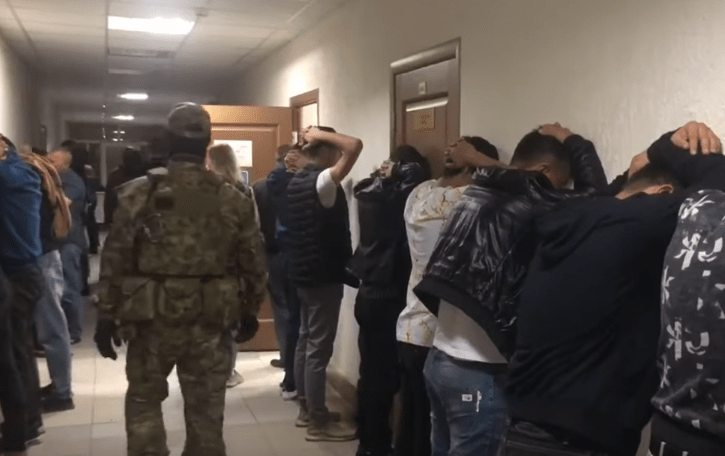The declared goals of Russia’s military invasion of Ukraine changed “in accordance with the current situation”, but at the same time they were of a “fundamental nature,” Vladimir Putin announced to the “voenkory” (military correspondents) astonished by this statement. From the set of words/symbols that Russian propaganda juggles to explain the war, they pull out either “crossing the red lines”, or “fighting NATO”, or “defending the Russian language”, or – quite unexpectedly for the patriotic public – the fight against LGBT+ people. But now no one is surprised by the wavering of the “party position” and the windings of propaganda: recently Putin even announced that, it turns out, Wagner PMC never existed.

The first of the two original goals of the invasion, the “demilitarization” of Ukraine, is sometimes mentioned by Russian propaganda, even against the backdrop of negotiations for Ukraine’s accession to NATO. Recently, Dmitry Peskov announced that Russia’s success, it turns out, lies in the fact that Ukraine is fighting not with its own, but with someone else’s weapons! But the second goal, “denazification”, was almost immediately blurred in the Russian media. On the one hand, some Russians not only could not understand what it means. but even pronounced this word with difficulty. On the other hand, the propaganda obviously did not expect that this very word usage would cause the development of anti-imperial, anti-colonial discourse and reflection on the topic of xenophobia and racism deeply rooted in Russian society. “Now the Kremlin, having announced the denazification of Ukraine, has given us the opportunity to finally publicly declare that this problem [racism] exists in Russia, and it is very serious,” said Alexandra Garmazhapova, head of the Free Buryatia Foundation.
Human rights activists have been talking about the seriousness of the problems of racism and discrimination in Russia over the past decades, but it is only now becoming clear to many how closely propaganda of national greatness, “traditional values” and migrantophobia are connected with a real war, with the death of innocent people, the intensification of xenophobic sentiments, including anti-Ukrainian ones. After all, the real risk of dying for the “Russian world” arose before people who were humiliated and discriminated against because they did not belong to this world. And at the same time, it was they, “non-Russians”, who were charged a special accountability for participating in aggression (I remember that even the Pope attributed “special cruelty” to the Buryats and Chechens). It was to them that Putin’s pathetic statement “I am a Lak, I am a Dagestani…” was addressed in the perverted “I/We” genre, more like a criminal custom to tie up accomplices with blood.
The accomplices, meanwhile, sorting out among themselves, also began to play the national card: Yevgeny Prigozhin accused Sergei Shoigu and Valery Gerasimov of the “genocide of the Russian people”, emphasizing that for the Russian Minister of Defense, this genocide was “on a national basis”, implying, one must think, that the malignity is due to Shoigu’s Tuvan origin. But even Prigozhin himself was suddenly attacked “for his nation”: they say, he is a non-Russian, and more than that – a Jew.
In terms of the speed of playing the “nation” card, the high-ranking war criminals are no different from any other strata of Russian society, which is not surprising given the Russian authorities’ denial of the problem of racism. Conflicts between members of different ethnic groups quickly develop into national ones. This often happens in places where Roma/Gypsies are densely populated. Separate cases thundered throughout the country: for example, a mass brawl in the village of Chemodanovka in the Penza region, which turned into a pogrom and the flight of more than a thousand Roma, who were declared guilty. But since the systemic problems of the Roma settlements and their inhabitants are not being resolved, and the degree of “nazification” in the country is high, new incidents occur – like the recent one near Novosibirsk, where, fortunately, there were no casualties. The journalist quotes the words of a rural store saleswoman who witnessed a mass brawl: “Gypsies did not initially show aggression, they were threatened. People have a lot of hatred – on national ground! And this is scary in the light of the current situation in the country, the incitement of these interethnic conflicts is completely unnecessary for anyone.” From thy mouth to God’s ears!
Unfortunately, we can expect an escalation of violence in Russian society, including on the basis of xenophobia: the level of aggression in the country was high even before the war, and even more so now. It is well known that mentally unstable demobilized soldiers bring with them the habit of violence from the war, to say nothing of the released Wagner criminals…
Olga Abramenko – expert of the Anti-Discrimination Center Memorial
First published on Radio Liberty’s blog









 Feedback
Feedback